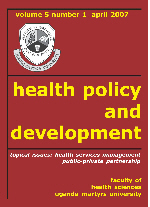
|
Health Policy and Development
Department of Health Sciences of Uganda Martyrs University
ISSN: 1728-6107 EISSN: 2073-0683
Vol. 3, Num. 2, 2005, pp. 114-116
|
Health Policy and Development Journal, Vol. 3, No. 2, August, 2005, pp. 113-114
LETTERS
IN HIV TRANSMISSION, IS ABSTINENCE LESS PRAGMATIC THAN FEAR?
Daniele Giusti
Code Number: hp05015
Dear Editor,
I have read the Editorial "Pragmatic safe sex, not abstinence or faithfulness, was key in Uganda's HIV decline" in Health Policy and Development Vol. 3 No.1- 2005. However, I wish to take distance myself from what the Editorial says and I will explain. The key point the Editorial seems to make is about the motivations which may have led a certain number of Ugandans to the decision of changing their behaviour, i.e. having less casual partners and/or to use condoms when having casual partners. The conclusion, if I followed the arguments well, is that neither the strong advocates and supporters of condoms nor the Evangelical Christians and African Traditionalists - advocates and supporters of abstinence and faithfulness - are right. The point made is simply that people have adopted a "pragmatic safe sex" approach. I am not sure I fully understand what this means and therefore I can only try to attach my understanding to this semantic choice. The only conclusion I can draw is that, while the Editorial recognises that fear may have been a strong motivator for the change of behaviour, it seems to attribute very little importance to the choice of abstinence and faithfulness, thereby minimising or denying the fact that "values" such as these two play any role in behaviour change. I am not aware of any study that has tried to investigate "motivations" for choice(s). Therefore I can only say that the title of the Editorial - and the choice of using the negative adverb "not" - has the value of personal opinion, respectable, but perhaps not supported by hard evidence. On the other hand, hard evidence on motivational assessments is not easy to come by. When considering human behaviour, it is probably preferable to accept that it rarely follows a perfectly linear direction: it is influenced by so many factors and subject to so many ups and downs and right and lefts. Pragmatism cannot be opposed to value choice, as the Editorial seems to imply, because there is a little bit of everything in our behavioural choices, even in "higher" values such as abstinence and faithfulness, and "less honourable" reasons such as fear (no judgement of value expressed on fear, simply lack of better words). Excluding, as the Editorial seems to do, the role played by abstinence and faithfulness in the Ugandan "success story" is, in my view, pushing things too far. What worries me, anyhow, is a different issue altogether. I seem to draw from the Editorial the impression that the authors do not trust the capacity of large numbers of Ugandans to make choices driven by values such as abstinence and faithfulness (either based on religious or traditional grounds). To the authors, their actions can only be driven by basic instincts like fear. This, I must say, deeply saddens me because I think that the contrary is true. No matter how strong our sexual (and other) drives are, there is something deep in the heart of each one of us that recognises what is good, true, right, beautiful, consistent with the dignity of the human person, reasonable etc… that does not need to be demonstrated by scientific evidence. We often describe this "something" with the term "values". Values are simply there in each one of us and they can guide our instinctive drives. They are part of our being human. Morality, at least for Catholics, does not necessarily coincide with a perfect consistency with the recognised values I have talked about. It is rather the continuous tendency towards them, unwavering even in the face of ever-possible failures. What these values need in order to develop (rather than being dwarfed by instinct) is the nurturing provided by a supportive social and cultural environment. It is not a question of fear of punish-ment or death. It is a question of an environment maintaining a positive outlook on human nature and in the capacity we have to respond to the difficult appeal of values. If we abandon this approach, we can only look forward to a progressive levelling towards instinctive choices, not exactly what we need and what the fight against AIDS needs.
This is the major objection I have to the Editorial: it seems to denounce two opposite "ideological" positions (AB and C) only to adopt a third one: the ideology of pragmatism. As the other two, when they take up an ideological hue, they oversimplify the complexity of reality. As men and women of science, we cannot afford to avoid the challenge of this complexity, not even in the name of pragmatism. In any case, I am a strong supporter of Abstinence and Faithfulness, from a completely non-ideological and non-moralistic point of departure. It's a question of anthropology.
Dr Daniele Giusti Executive Secretary UCMB
Copyright 2005 - Department of Health Sciences of Uganda Martyrs University
|
